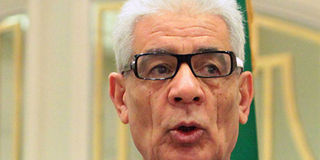Libyan Foreign Minister defects to London but told no imunity

In this photo dated March 19, 2011 Libyan Foreign Minister Mussa Kussa speaks during a press conference in Tripoli . The defection is seen as an indication that the strongman’s regime is crumbling.AFP PHOTO/MAHMUD TURKIA
NEAR BREGA, Libya, Thursday
Libyan leader Muammar Gaddafi suffered a major blow with the defection of his foreign minister even as his forces bombarded a rag-tag rebel army seeking to topple him into disarray.
A rebel fighter said Gaddafi’s loyalists were riding through the streets of the oil town of Brega shooting randomly on Thursday, a day after pushing the insurgents back more than 200 kilometres along the coast.
Mr Awad Alurfi, a former army captain turned rebel fighter, said at least one rebel had been killed in the fight for Brega, 800 kilometres east of the capital Tripoli.
Experts said the opposition lacks anti-tank weapons, radios and other basics, but above all the disjointed, chaotic force needs some rudimentary training.
The defection of Foreign Minister Mussa Kussa, the most senior figure to defect since the uprising against Gaddafi’s iron-clad 41-year rule erupted more than six weeks ago, is seen as an indication that the strongman’s regime is crumbling.
Mr Kussa’s arrival in Britain was a “sign that the regime’s days are numbered,” defected immigration minister Ali Errishi told France 24 television on Thursday.
“It is the end... it is a blow to the regime (and) others will follow,” said Errishi who himself defected soon after the insurrection began.
“Kussa was his most trusted aide. Gaddafi no longer has anybody. It’s just him and his kids.”
Libya’s former deputy ambassador to the UN, Ibrahim Dabbashi, told France 24 in a separate interview that Kussa’s defection “was very important at this stage because he knows a lot of secrets of the regime. He has been working with the Gaddafi regime for a long period now.”
Meanwhile, British Foreign Secretary William Hague said on Thursday Mr Kussa has not been offered immunity from prosecution in Britain or internationally after he arrived in Britain.
“Mussa Kussa is not being offered any immunity from British or international justice. He is voluntarily talking to British officials at the moment,” Hague said.
Mr Kussa resigned his post and said he no longer wanted to represent Libya internationally after he arrived at Farnborough Airport on a flight from Tunisia on Thursday, Hague said.
“His resignation shows that Gaddafi regime, which has already seen significant defections to the opposition, is fragmented, under pressure and crumbling from within,” the British minister added.
“Gaddafi must be asking himself who will be the next to abandon him.” Britain has repeatedly said that Gaddafi should face the International Criminal Court.
As head of Libyan intelligence for 15 years before he became foreign minister in March 2009, Mr Kussa is credited with convincing Gaddafi to dismantle his nuclear weapons programme and seek rapprochement with the West.
But he is also suspected of being a key player in the bombing of a Pan Am jet over the Scottish town of Lockerbie in 1988, which killed 270 people.
Mussa Kussa arrived at Farnborough Airfield, west of London, on Wednesday, a Foreign Office statement said. “He travelled here under his own free will. He has told us that he is resigning his post,” it added.
The New York Times, meanwhile, reported that the United States and Britain had inserted covert intelligence agents into Libya to make contact with rebels and to gather data to guide coalition air strikes.
The White House refused to comment on the apparent shadow war and also declined to discuss another report that President Barack Obama had signed a secret order allowing Central Intelligence Agency operations in the country.
A senior US official did, however, welcome the defection of Kussa, interpreting his flight as a sign that Gaddafi’s inner circle was beginning to crumble.
“This is a very significant defection and an indication that people around Gaddafi think the writing’s on the wall,”




